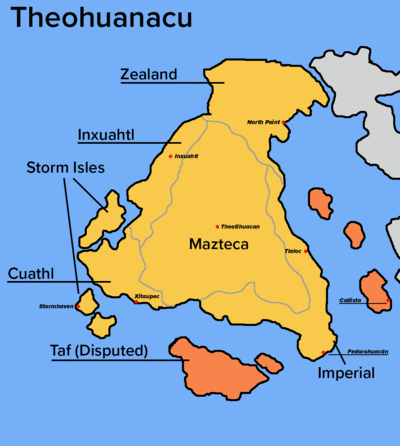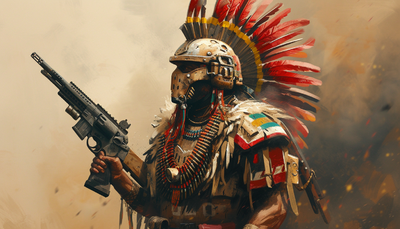Theohuanacu: Difference between revisions
(→Empire) |
|||
| Line 71: | Line 71: | ||
Military operations against the southeastern pirate cities commenced in December MC 2021. This series of battles is known as the First Theohuanacu Pirate War, and the fighting is considered to have ended in August MC 2022. However, six months later, the conflict renewed again, known as the Second Theohuanacu War.<ref>[https://forum.nationstates.net/viewtopic.php?p=22305318#p22305318 p22305318, ''Titanomachy OOC'', International Incidents, NationStates]</ref> | Military operations against the southeastern pirate cities commenced in December MC 2021. This series of battles is known as the First Theohuanacu Pirate War, and the fighting is considered to have ended in August MC 2022. However, six months later, the conflict renewed again, known as the Second Theohuanacu War.<ref>[https://forum.nationstates.net/viewtopic.php?p=22305318#p22305318 p22305318, ''Titanomachy OOC'', International Incidents, NationStates]</ref> | ||
===Imperial Military Recruitment=== | |||
Since the territory's formal annexation into the imperial federation, military recruiment is common in Theohuanacu. Theohuanacan soldiers have served in pacification duties in Zarbia,<ref>"While most Macabean soldiers, Theohuanacu auxiliaries mostly, are not involved in the fighting, they are regularly deployed in nation-building missions." [https://forum.nationstates.net/viewtopic.php?p=31242307#p31242307 p31242307, ''Greater Díenstad News Feed'', International Incidents, NationStates]</ref> among other parts of the empire. | |||
Soldiers recruited from other territories and satrapies of the empire have also served in Theohuanacu. Zarbian recruits, for example, are known to have operated in southeastern Theohuanacu during the Gothic War.<ref>"The Fuermak is still growing and 'Army Group Zarbia'...most of these new recruits are destined for Gholgoth, and before that either Holy Panooly or Theohuanacu." [https://forum.nationstates.net/viewtopic.php?p=31242307#p31242307 p31242307, ''Greater Díenstad News Feed'', International Incidents, NationStates]</ref> | |||
===Revolt and the End of the Slave Trade=== | ===Revolt and the End of the Slave Trade=== | ||
Revision as of 22:30, 6 February 2024
Theohuanacu is a territory of the Golden Throne, joining the federation in MC 2019 after a Macabéan invasion. It is the largest island of the archipelago continent Xipil in Greater Dienstad.
Territorial Organization
Zealand Freestate
The Zealand Freestate is the wealthiest and most populous freestate in Theohuanacu. Its government sits at the capital city of North Point.
Cuathl Freestate
Occupying the southwest portion of Theohuanacu, the Cuathl Freestate is governed from its capital city of Xitaupec.
Inxuahtl Freestate
With its capital city at Inxuahtl, the Inxuahtl Freestate makes up most of the western Theohuanacu coastline.
Storm Isles Freestate
The Storm Isles are composed primarily of the three major islands off the southwestern coast of Theohuanacu. This freestate's capital sits at Stormhaven.
Imperial Freestate
The Imperial Freestate was founded in MC 2029. Its capital sits at Tlaloc. Another city in the Imperial Freestate, Fedorohuacan, will become the territorial capital in MC 2035.
Mazteca Freestate
Landlocked, the Mazteca Freestate was founded in MC2029 and comprimises the center of Theohuanacu. Its capital city is Theotihuacan.
Disputed Territory
Both the territorial government of Theohuanacu and the imperial federal government claim the Thacu Islands and the Island of Taf as parts of historical Theohuanacan lands. Both are currently occupied by United Gordonopia.
Government
Territorial Government
Since the Treaty of Tlaloc in MC 2030, Theohuanacu's territorial government is composed of three branches: the governorship, legislative, and territorial courts.
The governor is directly appointed by the emperor of the Golden Throne and holds executive priviliges, including the right of veto over laws enacted through the Theohuanacu legislative branch. The governor also holds the right to ignore an overrule of their veto by the legislative branch. Although the governor cannot be directly removed by either the legislative or courts, the incumbent can be removed from power at any time by the emperor.
Two chambers make up the territorial legislative branch: the Euque and Konsolari. Freestates vote three representatives to the Euque, the upper chamber, every two years. The Konsolari forms the lower chamber and is made up of more than 300 seats, each of which is distributed to a freestate proportionally to its population. Territorial legislative action must flow from the Euque to the Konsolari, but the Euque's Kríeror must be voted for by the Konsolari. The Kríeror serves as president of the upper chamber.
The territorial courts are responsible for the interpretation of territorial law. A supreme court, the Calixequi, serves as the highest court of territorial law and holds partial jurisdiction over the interpretation of treaty law as it concerns the Treaty of Tlaloc.
Imperial Government
Since MC 2019, the primary executive of Theohuanacu is the governor. The governor is appointed and replaced directly by the emperor, who is advised by a kríerlord assigned to observing the government of the territory. The imperial courts are represented in Theohuanacu via a string of freestate courts, with jurisdiction over the local enforcement of federal law, and the Theohuanacan Koert of the Willed. This latter court is presided by seven judges appointed by the kríerlord kuncil for life. It is serves as the highest imperial court in Theohuanacu and is also the supreme authority in the interpretation of treaty law as it concerns the Treaty of Tlaloc.
The current Kríerlord assigned to Theohuanacu is Angiko Bas.[1]
History
Rebels, Pirates, and Secessionists
At the dawn of the 21st century MC, a confederation of southeastern Theohuanacan coastal port cities led by Tlaloc, Palenque, and Tiwanaku operated as safehavens for piracy, their governments long ago coopted by criminal elements. Their ships, officially unaffiliated but nevertheless given safe harbor, raided the western Theohuanacan coasts in search of loot and slaves to sell in the newly lucrative Firmadorian markets. Western Theohuanacu was devastated as pirate ships destroyed, murdered, and raped their way up and down the coastline. In MC 2004, Tapexa's harbor was heavily damaged in an attack led by Captain Jonah "Green-Skinned" Deringer. Inxuahtl and its surrounding townships also suffered heavily from repeated pirate attacks on municipalities as small as secluded fishing villages. By MC 2007, the resurgent pirates attacked and took Callisto, capital of the Thacu Islands. The raiding expanded to the southwestern Panooly and the northeastern Indran coastlines.[2]
The freestate government in Zealand waged a shadowy war against mounting subversive forces,[3] in the name of Theohuanacu, but the national government proved largely incapable of extending their control beyond the capital city. Located in the center of the country by design, Theotihuacan was faraway from North Point, the freestate capital of Zealand. The two governments drifted as North Point became the increasingly dominant partner in the relationship. As fewer government forces intervened in the west, rebel movements, such as the the Free Inxuahtl Movement, consolidated their forces and launched a revolution engulfing most of central and western Theohuanacu.[4]
A nascent Golden Throne had meanwhile aligned itself with Holy Panooly and, possibly to protect southerwestern Panooly coasts without involving itself militarily, issued a contract to the southeastern Theohuanacan pirates to escort a division-sized mercenary unit to the inland southwestern city of Nichahuan. But the operation turned sour when the contract was suddenly rescinded. No longer receiving pay from the Golden Throne, the mercenaries established a government of their own in the city and began taxing its inhabitants. Relations between the private military contractors and their pirate escorts deteriorated for unknown reasons, causing the mercenaries to expel the latter. In retaliation, the pirates joined with the remnants of the local rebel forces previously defeated and jointly attacked and sacked Nichahuan. Survivors were sold into slavery.[5]
In 2010, the Zealand Freestate seceded from Theohuanacu to become an independent state. It became known that rebels had captured stockpiles of nuclear weapons after overruning Theotihuacan. They were not slow to use them, almost all of them exclusively within the confines of central Theohuanacu. Theotihuacan and most of the center surface of the island were devastated and became uninhabitable, remaining so to this day. The western freestate was largely protected by the fallout by virtue of the mountain range running north to south, seperating them from the rest of the continent. The pirate cities, however, received the brunt of the fallout, leading to largescale population loss as a result of heavy radiation poisoning. Tlaloc was particularly affected.[6]
Empire
Theohuanacu was invaded by the Golden Throne in MC 2019, with the intention of using the island's resources to supply a potential war against Stevid.[7] The official cassus belli was the arrest and murder of a Macabéan tourist in North Point, which prompted the occupation of North Point and the imposition of a peacekeeping mission on the entirety of the country.[8] Tarn was occupied in an initial phase of the occupation,[9] followed by an uncontested landing in northeastern Theohuanacu. The initial invasion stood out as a result of the use of Guffingfodi and Havenic auxilaries,[10] soldiers recruited from the recently annexed Havenic and Guffingfordi territories. Simultaneously, Macabéan surface ships raided Indran oil platforms along the Theohuanacan coast before the imperial government announced a unilateral decision to end foreign drilling off the Theohuanacan coast.[11]
At first, the Macabéan invasion of Theohuanacu prompted the intervention of Adaptes Astrates. Stevidian warships and aircraft also closely monitored the movement of the Macabéan fleet, which sailed through the Sea of Otium Aqua. However, eventually an agreement was signed between the three powers, trading a cesation of Macabéan claims in Jumanota, aside from the occupation of Tarn, in exchange for a guarantee of non-intervention in the Theohuanacu conflict.[12] The Golden Throne's aggression in Theohuanacu, however, promoted Stevid to occupy an island chain south of Guffingford as means of bolstering its naval deployments in the seas between the Golden Throne and Theohuanacu.[13]
After securing the Zealand Freestate, the Golden Throne's invasion continued into the central landmass, with the intended occupation of Theotihuacán. Because the area was largely uninhabited, as a result of the nuclear exchanges of MC 2010, this phase of the annexation also went largely unimpeded. However, because of the distances and terrain involved, the empire's mechanized forces suffered a particularly heavy attrition rate and the full occupation took two weeks. Theotihuacán was eventually occupied and used as a barracks for a long-term operation to decontaminate central Theohuanacu from nuclear radiation.[14] This decontamination is under the oversight of the Agén Rognuklek,[15] has yet to be completed.
Operations into western Theohuanacu occured simultaneously, initially consisting of thunder runs carried out by the newly established regulíes, foreign legion units organized under the Ejermacht.[16]
Military operations against the southeastern pirate cities commenced in December MC 2021. This series of battles is known as the First Theohuanacu Pirate War, and the fighting is considered to have ended in August MC 2022. However, six months later, the conflict renewed again, known as the Second Theohuanacu War.[17]
Imperial Military Recruitment
Since the territory's formal annexation into the imperial federation, military recruiment is common in Theohuanacu. Theohuanacan soldiers have served in pacification duties in Zarbia,[18] among other parts of the empire.
Soldiers recruited from other territories and satrapies of the empire have also served in Theohuanacu. Zarbian recruits, for example, are known to have operated in southeastern Theohuanacu during the Gothic War.[19]
Revolt and the End of the Slave Trade
Economy of Theohuanacu
Piracy and the Vices
The economy of southeastern Theohuanacu was dominated by piracy until the destruction of Tiwanaku and Palenque in MC 2029. A significant portion of the trade carried through pirate ships was the sale of illicit pharmaceuticals, including cocaine, marijuana, heroin, and other drugs. The growing and production of these drugs dominates the agricultural economy of the area to this day. The production and sale of most illicit substances was legalized post-annexation, leading to much of this trade to return to the formal economy.[20]
Until the advent of the Gothic War, human trafficking remained a powerful segment of the southeastern Theohuanacu economy. The slave trade remained active,[21] even under putative Macabéan oversight,[22] until the rebellion of the southwestern city-states in MC 2026.
References
- ↑ Dramatis Personae, The Macabees, NationStates
- ↑ "Taking advantage of this chaos, the Soria rounded the western coast of Theohuanacu and raided along the Inxuahtl coastline for the duration of the spring and summer. Local fishing villages were razed, their people raped, murdered, or sold into slavery. Larger towns did not escape Deringer's wrath, either. Tapexa, where he had first been sold into his current life, was attacked several times. Its port was utterly devastated, thousands of its inhabitants killed or captured..." p34482159, Titanomachy, International Incidents, NationStates
- ↑ "In western Theohuanacu, he had helped Zealand's soldiers track indigenous militants back to their safe havens along the coastline." p33847989, Titanomachy, International Incidents, NationStates
- ↑ "The insurgency had multiplied. FIM forces were now some among many more. Tens of thousands had risen in arms, forming into militias and war parties that moved eastwards toward the capital city of Theotihuacan." p34482159, Titanomachy, International Incidents, NationStates
- ↑ "Jonah accepted a contract to escort and reinforce a division-sized force of nominal mercenaries tasked with taking the inland city of Nichahuan...the imperial faucet closed shut and the so-called mercenaries turned to what a sadist may call taxation." p34482159, Titanomachy, International Incidents, NationStates
- ↑ "In North Point, the government seceded to form an independent Theohuanacan state. Nuclear stockpiles held around the capital were overrun and captured, and then the militias used them on each other...When they made port in Tlaloc, they found it almost...dead. The nuclear war hadn't come here, but the people said that radioactive clouds had stormed through several times." p34482159, Titanomachy, International Incidents, NationStates
- ↑ "A country the size of the empire will be turned into one huge industrial complex – civilian goods, armaments and petroleum. It will be a colossal unsinkable supply depot that will be able to supply troops throughout the entire region, and perhaps the entire world." p3761, Babel, International Incidents, NationStates
- ↑ "A Macabee tourist by the name of Mikhail Thanes was killed today by a local soldier when escorted to a prison...In a speech to the Empire, Fedor I declared that, ‘The Empire will soon take an active role in the problems of Theohuanacu. I have ordered a large number of soldiers to deploy to this nation as peacekeepers to help establish a lasting end to the ongoing civil war." p3765, Babel, International Incidents, NationStates
- ↑ "The Empire did not like to waste time, and their deployment to Tarn was immediate." p3765, Babel, International Incidents, NationStates
- ↑ "This morning, four imperial infantry divisions have landed in Eastern Theohuanacu, finalizing the occupation of North Point and taking most of the North Eastern corner of the island." p3769, Babel, International Incidents, NationStates
- ↑ "The Empire will not allow companies to illegally drill what is now its oil, even if these companies are protected by the flag of Indras." p3769, Babel, International Incidents, NationStates
- ↑ "Adaptes Astrates has formally agreed not to interfere with the imperial occupation of Theohuanacu, while Fedala has promised not to further claims in the disputed territory between Adaptes Astrates and Holy Panooly..." p3769, Babel, International Incidents, NationStates
- ↑ "The ‘Guffingfordii Island Chain’ as it is now known (Approximately fifty islands south of Guffingford) is falling quickly into the Holy Empire’s hands in a bid to control and properly safeguard the surrounding seas. Around thirty of the fifty islands have been occupied with no resistance, around 30% are uninhabited while the rest are inhabited by natives." p3771, Babel, International Incidents, NationStates
- ↑ p3772, Babel, International Incidents, NationStates
- ↑ "Hundreds of thousands of pounds of soil have been imported from the Ordenite mainland already according to declassified reports published by the Agén Rognuklek, the Imperial agency in charge of the ongoing decontaminations of central Theohuanacu and the surface of New Empire." Greater Díenstad News Feed, International Incidents, NationStates
- ↑ "These harkas were brigade-sized infantry units, recently arrived in Theohuanacu after an intense training program in Guffingford, belonged to what was no considered the elite Díenstadi Régulies force – a completely foreign military arm belonging to the Macabee Ejermacht. Most of these men had prior military experience." p3772, Babel, International Incidents, NationStates
- ↑ p22305318, Titanomachy OOC, International Incidents, NationStates
- ↑ "While most Macabean soldiers, Theohuanacu auxiliaries mostly, are not involved in the fighting, they are regularly deployed in nation-building missions." p31242307, Greater Díenstad News Feed, International Incidents, NationStates
- ↑ "The Fuermak is still growing and 'Army Group Zarbia'...most of these new recruits are destined for Gholgoth, and before that either Holy Panooly or Theohuanacu." p31242307, Greater Díenstad News Feed, International Incidents, NationStates
- ↑ "The majority of these farmers grow what used to be illegal substances, including poppies, marijuana and other drug-producing plants. Since the finalization of prohibition the pressure on these farmers to rebel against authority, in order to protect their trade, has decreased. These farmers no longer have economic reasons to revolt, and indeed, they have more reason to support the Imperial government in Theohuanacu." Peace Through Liberty, International Incidents, NationStates
- ↑ "There has always been human trafficking problems in Greater Díenstad, including that committed by the southern Theohuanacu pirates, which for years operated autonomously under putative imperial authority." p32983011, Greater Díenstad News Feed, International Incidents, NationStates
- ↑ "Despite a history of neither regulating against it or supporting the slave trade through its southern Theohuanacu ports.." p31912575,Greater Díenstad News Feed, International Incidents, NationStates


